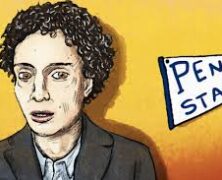I used to smoke Marlboro Reds, still to my mind the best tasting cigarette out there. I can remember opening a second box once because I was enjoying them so much, though that didn’t happen often. I might have got through as many as thirty that day. As a rule though, I smoked about ten in a day. Part of me misses that old self, before the intolerance. I envy heavy smokers. I imagine they are the least bored, most creative of people, and because they persist with it while the rest of us – ex-smokers and non-smokers – judge them as ignorant or irresponsible or maybe simply a bit too cavalier, they effectively tell us, “I don’t care what you think.” It’s this tendency some people have to not care (or at least not to care in any demonstrable way) that I think helps to explain the continuing appeal of smoking. Smoking is a way to stick two fingers up at the world but it can also be a means for those with low self-esteem to fit in. I remember watching an acquaintance pretend to inhale a cigarette. He was an accomplished athlete and relied on that for popularity but his need for acceptance occasionally grew enough for him to bum a fag. I disliked the practice of pretending to smoke and still do today. Smoking is dangerous and ill-advised; that’s the whole point. It’s not like having one last drink in the pub even though you’ve had enough already or eating too much on Christmas day. Smoking is a way to express things all too often discouraged in us: defiance; rebelliousness; nonchalance; rage; disregard for one’s own well-being; fascination with death. It’s not unfortunate that it’s bloody unhealthy and can kill you:...
A VISIT FROM CIARÁN COLLINS...
posted by Cloud
Every new school year brings with it hopefully a new year for CloudofThink. It must be admitted, however, that the creative writing club has struggled somewhat to get off the ground this year. We decided then that it was about time to raise a greater awareness of the club and of the general pastime of writing by inviting an author to the school to speak to students. Ciarán Collins, a Cork writer and teacher, kindly consented to come along to our school on Tuesday 20th, and discuss both his new book and the process of writing. This book, Mr Collins’ first, is called The Gamal. It tells the story of Charlie, a lad from a small West Cork village, who keeps mainly to the sidelines of life but, contrary to the popular belief that he is a bit of a fool or “gamal,” notices anything and everything from joy to sorrow to the book’s central doomed romance. Charlie’s first-person narration meanders from the realms of the hilarious to the heart-wrenching in a touchingly real and relatable account of the life of a teenager. It was with a reading from the first pages of this novel that Mr Collins began the event on Tuesday, a reading which I could see left the whole audience enthralled and determined to read more of the book themselves. I then sat down with Mr Collins for what proved to be a fascinating and very informative discussion about his work. He described how, when he was beginning The Gamal, he thought it very important to “be as ambitious as I could… to try and write the very best deepest, funniest, most heartbreaking, engaging, insightful kind of a book that I could come up with,” a sentence which captures perfectly the...
The Tipping Point by Malcolm Gladwell...
posted by Cloud
It seems the whole world reads Malcolm Gladwell. It’s usually middle-aged men with a social conscience or season tickets and a taste for socially responsible and head-noddingly approvable views on politics who read him but they’ll always highly rate his work. But he is very readable, accessible and informative. Much of what he does here in “The Tipping Point” is predicated on anecdote. He starts almost every argument with an account of a social phenomenon such as the ride of Paul Revere on the eve of the American Revolutionary War or the fall in crime figures in New York in the early 90s. He meets a lot of people along the way and it can be difficult to keep up with all the personalities. What comes to the surface very clearly is that people are different and perform different roles in every social phenomenon there is. Gladwell characterises individuals as “Connectors,” “Salesmen” and other categories and demonstrates how “word-of-mouth epidemics” are dependent on many types of people. What much of the book comes down to is simply how things happen and who makes them happen in the precise way that they do. There is a lot in this of course and it is an ambitious task. Once the reader accepts some basic tenets of his approach, the book becomes much easier to navigate, chief among them being that little things can make big things happen and quite suddenly. There is a lot of history in the book, much social commentary and a lot of interviews with interesting people. The research is impressive, the organisation of the information is very efficiently done indeed and the idea is always kept in focus. There is much to be learned here not just about the idea of The...



